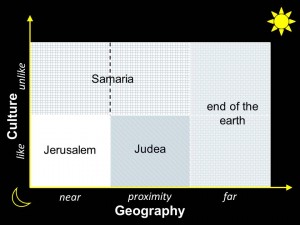Once you’re past trying to get God to bless your personal mission and realize the Christian life is about abandoning your long-loved private mission and surrendering the rest of your life to God’s mission (the Bible calls this repentance; it is the beginning point of one’s journey as a disciple of Jesus Christ), then you are ready to consider living life strategically.
After Jesus rose from the dead and as He was ready to ascend back to heaven He outlined for His followers the strategy in which He would lead them (and us!) for the rest of time. He laid out for them (and us!) the very strategy that would usher Him back to earth in His Second Coming. This was not something just for the first century, but for all the centuries to come. This was not something just for super-Christians, but for all us ordinary Christ-followers in all ages and in all places. If we are Christ’s, we’re all on one mission—God’s.
Here is how Jesus put it: “But you will receive power when the Holy Spirit has come upon you, and you will be my witnesses in Jerusalem and in all Judea and Samaria, and to the end of the earth.” (Acts 1:8)
The unfolding of the rest of history is laid out in this simple sentence. This is the God-designed, divinely-ordained strategy for all the rest of time—for His entire Church, for each church, and for every Christian.
As you can see the strategy has four key parts: the advance of the gospel to …
1) “Jerusalem”
2) “all Judea”
3) “and Samaria”
4) “to the end of the earth.”
Did you realize that this also is the basic outline of the Book of Acts? The Holy Spirit came upon the followers of Jesus in chapter 2 and then immediately God began, through them, to work the strategy. In the Book of Acts we see the disciples of Jesus advancing the gospel through their witness …
- in the city of Jerusalem (Acts 1-8:3)
- in the provinces of Judea and Samaria (Acts 8:4-12:25), and
- to the ends of the earth (Acts 13:1-28:31).
God gave us the Book of Acts to show us something of how the strategy was to be employed and the power and blessing we can expect when we surrender ourselves to God and work His strategy.
But I invite you to look at Acts 1:8 again, not just as an outline of Acts and the church’s activity in the first century, but as a strategic call to live your life on mission with God. Read Acts 1:8 again, this time as the plan for every century and all the followers of Christ, including you and me. This is to be a collective mission (the Church), a corporate mission (each church), and a personal (each Christian) mission.
See Jesus here placing a divinely-designed mission upon the Church in each generation, every church in every age, and upon every Christ-follower throughout all the ages. In this way we will see that we are each one responsible to reach those who are …
- within our Jerusalem,
- within our Judea,
- within our Samaria, and
- within our generation anywhere on the earth.
But what does that mean?
You will notice that living strategically in line with God’s mission involves living along two axes (that is the plural for axis, not a reference to two or more long-handled hatchets!).
One axis is geographical. The other is cultural.
Jerusalem =
Axis #1: Geographically near to me (think “where I live”).
Axis #2: Culturally like me (think “folks similar to me” in terms of income, neighborhoods, tastes, schools, ethnicity, language, etc.)
Judea =
Axis #1: Geographically in proximity to me (think “the other side of town,” “the next town over,” “in another
department at work,” “in another class at school,” etc.)
Axis #2: Culturally near to me (again think, “folks like me”)
Samaria =
Axis #1: Geographically in proximity to me (again think “in my town” or “in my immediate region”)
Axis #2: Culturally unlike me (I must cross a border of language, foods, ethnicity, holidays, religion, culture, etc. to reach them)
End of the Earth =
Axis #1: Geographically far from me (I must cross a boarder or an ocean to reach them physically)
Axis #2: Culturally unlike (in varying degrees) from me (I will probably have to cross a border of ethnicity, language, foods, holidays, religion, culture, etc. to reach them)
In additional posts I want to unpack what living strategically with Jesus means for each of us where we live. Until then, can you begin to identify people/groups/areas/towns/etc. in your life that fit each of these strategic target groups?
